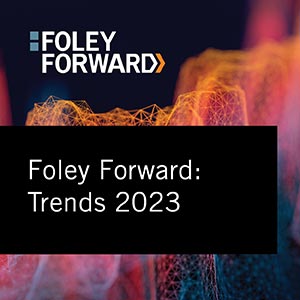
As the pandemic highlighted issues in the global supply chain and as the United States intensifies its investment in clean energy, more renewable energy manufacturers than ever are considering onshoring (or nearshoring) manufacturing facilities in the United States. Domestic demand for clean energy is at an all-time high and doesn’t look to be slowing. Domestic production may help satisfy U.S. consumer demand for predictable delivery schedules and prices. Below we outline some of the current forces driving the move to onshore. And while onshoring is uniquely incentivized right now, it is not without challenges, requiring critical consideration of the factors we explore below.
Current Onshoring Motivators
-
- Inflation Reduction Act (IRA) – The IRA provides significant tax credits for the manufacturing of certain renewable energy components as well as the purchasing and commissioning of property to build clean energy manufacturing facilities. The IRA further provides adders for these credits where manufacturers use domestically produced components in their facilities.
- Geopolitical Instability – Recent years have revealed the vulnerability of the supply chain. From shutdowns and delays due to the COVID-19 pandemic, the Russia-Ukraine conflict, and labor shortages, and regulatory changes, supply chain disruptions that were once infrequent have become ordinary.
- Antidumping Duties – In response to antidumping duties against solar panels made in China, certain solar panel producers migrated production to other Southeast Asian countries to avoid paying the duties. The U.S. Department of Commerce recently extended the tariff orders to those countries, limiting U.S. access to solar panels.
- Uyghur Forced Labor Act – The forced labor law prohibiting importation of certain goods manufactured in the Xinjiang province of China has created uncertainty in the U.S. solar market, as the supply chain of some of the solar panel manufacturers extends into the prohibited region. Seized goods have skyrocketed and the near-total lack of solar import has prohibited large-scale projects from moving forward.
Key Onshoring Considerations
- Site Selection – Choosing the right location requires consideration of a bouquet of factors, including power and water availability, permitting and zoning requirements, and access to necessary transport hubs, raw material suppliers, and key customers.
- Local Tax and Property Incentives – Property and facilities costs are higher in the U.S. However, various states offer additional tax exemptions, deductions, and credits to renewable energy manufacturers and sellers.
- Labor – Labor costs in the U.S. are also high while access to skilled labor may be low. Additionally, employee health and safety is highly regulated by OSHA. However, increased automation in processes mitigates these costs.
- Technology – IP enforcement options abroad can be limited, requiring the involvement of local government actors. The U.S. offers robust IP defense and enforcement options, reducing the overall threat of IP infringement.
- Logistics – Shipping costs, lead times, and other delivery logistics become easier and less costly as inventory becomes geographically proximate. Particularly so for large equipment and machinery which incur significant costs when shipping on a per unit basis.
Disclaimer
This blog is made available by Foley & Lardner LLP (“Foley” or “the Firm”) for informational purposes only. It is not meant to convey the Firm’s legal position on behalf of any client, nor is it intended to convey specific legal advice. Any opinions expressed in this article do not necessarily reflect the views of Foley & Lardner LLP, its partners, or its clients. Accordingly, do not act upon this information without seeking counsel from a licensed attorney. This blog is not intended to create, and receipt of it does not constitute, an attorney-client relationship. Communicating with Foley through this website by email, blog post, or otherwise, does not create an attorney-client relationship for any legal matter. Therefore, any communication or material you transmit to Foley through this blog, whether by email, blog post or any other manner, will not be treated as confidential or proprietary. The information on this blog is published “AS IS” and is not guaranteed to be complete, accurate, and or up-to-date. Foley makes no representations or warranties of any kind, express or implied, as to the operation or content of the site. Foley expressly disclaims all other guarantees, warranties, conditions and representations of any kind, either express or implied, whether arising under any statute, law, commercial use or otherwise, including implied warranties of merchantability, fitness for a particular purpose, title and non-infringement. In no event shall Foley or any of its partners, officers, employees, agents or affiliates be liable, directly or indirectly, under any theory of law (contract, tort, negligence or otherwise), to you or anyone else, for any claims, losses or damages, direct, indirect special, incidental, punitive or consequential, resulting from or occasioned by the creation, use of or reliance on this site (including information and other content) or any third party websites or the information, resources or material accessed through any such websites. In some jurisdictions, the contents of this blog may be considered Attorney Advertising. If applicable, please note that prior results do not guarantee a similar outcome. Photographs are for dramatization purposes only and may include models. Likenesses do not necessarily imply current client, partnership or employee status.
Author(s)
Related Insights
December 19, 2025
Health Care Law Today
Gender Affirming Care for Minors: CMS and HHS Propose Limits on “Sex Rejection Procedures” and Expanded Enforcement Pathways
On December 18, 2025, the U.S. Department of Health and Human Services (HHS) held a press conference focused on what is defined as “sex…
December 19, 2025
Foley Viewpoints
Prohibition to Prescription: What Trump’s Marijuana Executive Order Really Means
On December 18, 2025, President Donald Trump issued an Executive Order, Increasing Medical Marijuana and Cannabidiol Research, that…
December 18, 2025
Manufacturing Industry Advisor
Foley Automotive Update
Analysis by Julie Dautermann, Competitive Intelligence Analyst Foley is here to help you through all aspects of rethinking your long-term…


